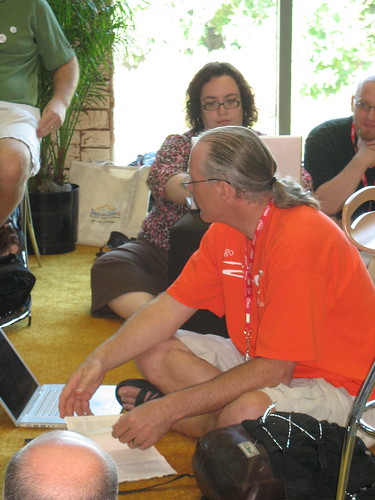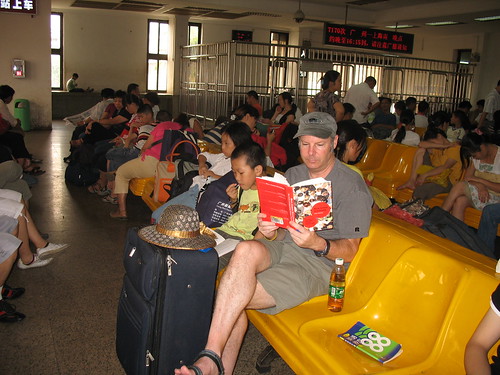 had many varied experiences and connections. The first day for Edubloggercon I sat in on a discussion of the book Here Comes Everybody by Clay Shirky. A group of educators sat in a circle with Will Richardson facilitating the discussion. Many voices were heard in that short period of time and the most powerful ones were by educators I was not familiar with. Comments by those who were more well known were not as powerful as others. A large part of the discussion was addressing elements of the book and how it should impact our teaching and classrooms. The group who participated included many leaders in the implementation of 21st century tools. Many of them had laptops, cell phones and were well versed in all the vocabulary and experiences that Web 2.0 has to offer. Dean Shareski put together a compendium of video images composed of friends within his PLN from amongst those gathered. One interesting result of what Dean uploaded to Youtube was a repurposing of this home movie of friends as a foundation for a blog post by Mathew Tabor of why he doesn't or wouldn't go to the NECC. It was amazing and somewhat disturbing to see his argument by manipulating what was never intended as a documentary of the event but more of a home movie.
had many varied experiences and connections. The first day for Edubloggercon I sat in on a discussion of the book Here Comes Everybody by Clay Shirky. A group of educators sat in a circle with Will Richardson facilitating the discussion. Many voices were heard in that short period of time and the most powerful ones were by educators I was not familiar with. Comments by those who were more well known were not as powerful as others. A large part of the discussion was addressing elements of the book and how it should impact our teaching and classrooms. The group who participated included many leaders in the implementation of 21st century tools. Many of them had laptops, cell phones and were well versed in all the vocabulary and experiences that Web 2.0 has to offer. Dean Shareski put together a compendium of video images composed of friends within his PLN from amongst those gathered. One interesting result of what Dean uploaded to Youtube was a repurposing of this home movie of friends as a foundation for a blog post by Mathew Tabor of why he doesn't or wouldn't go to the NECC. It was amazing and somewhat disturbing to see his argument by manipulating what was never intended as a documentary of the event but more of a home movie.At NECC I even later saw a flash mob in the main area of the conference hall but did not understand what it was for at the time and although it was enjoyable to see a group suddenly freeze with my background in art history and performance art, I didn't realize what it represented.
When you look at Shirky's steps of building community from first sharing, to cooperation, to finally collective action. I would say the edtech community is built around sharing and the level of cooperation is what is seen as individuals and classrooms create temporary projects together but there is really no long term or sustained participation. When I think in terms of the edtech community, what do I really mean? Certainly someone such as Stephen Downes has well reasoned arguments for why there is no community per say. But could there ever be a point in which collective action could be possible. Why haven't we heard of anyone out of such a vocal group that has created a community or new school outside of Chris Lehmann and the SLA?
Of some of the other points the book was making that caused me to reflect back on my PLN and my relationship to it would be the idea of "connectors." These are the people who join together separate networks or groups. I think these are always the people I try to have as part of my network on twitter for example. I wonder though say on twitter if I look at TweetWheel if I can't find visually find connectors within my own Tweetwheel group but also by following certain people begin intersecting networks myself.
Lastly, the idea that struck me in relation to students was that of failure and the "power law distribution." When and how do we share this with students. How do we make them aware without taking away their motivation to challenge and change the status quo with their ideas? I thought of those individuals who can withstand continuous failure for an occasional success versus those awkward and uncertain students just learning to take risks and are sensitive to failure. Would one solution be to use the video game experience of repetition and relentlessness in order to achieve the next level in some game?
When I came home, I left a few days later for China and I decided I needed to read the text and see if it was as important for me as everyone talked about. I purchased the book and started to read it on my flight over to China. As I've slowly learned about the Chinese culture I've been amazed so far at the high level of organization with in the social groups that are formed around family and friends. Just as we've heard the discussion of our children maintaining connections even after individuals leave organizations such as high school, the same is true for most of the individuals I met in
 China. What I would like to understand better is what organizing principals or structure was in place before the wide spread distribution of the cell phone. This is most peoples primary tool to connect. As where now when someone in the US who is a savvy user has a problem they may first get online and try and search for a solution. For a well connected Chinese individual it is more a matter of making phone calls moving from the small network to a connector until a solution is found. With a lower standard of living most people cannot yet afford a computer so it will be interesting to see how social networks build up around cell phones.
China. What I would like to understand better is what organizing principals or structure was in place before the wide spread distribution of the cell phone. This is most peoples primary tool to connect. As where now when someone in the US who is a savvy user has a problem they may first get online and try and search for a solution. For a well connected Chinese individual it is more a matter of making phone calls moving from the small network to a connector until a solution is found. With a lower standard of living most people cannot yet afford a computer so it will be interesting to see how social networks build up around cell phones. When I sat in the train station to begin my journey home and was reading, I realized that not only is this mode of transportation quite common. It also to me represents a way of living that I experience so little of here in the US. I've ridden my share of public transportation while I lived in San Francisco and didn't have a car. But these days by and large I am driving by myself or with my family and don't have the direct experiences of others that I experience when I'm in China. It makes me wonder if my experience of my PLN has the same sort of separated or indirect experience of other as opposed to sitting on a train and having so much direct experience. I may ask of my Twitter network how to solve a problem, but for my wife she begins with calling close relationships and slowly if an answer is not found does she shift to more of a superficial connection. Is this natural way of connecting with others a better way to organize a social network?
If the majority of Chinese are coming with their cell phones, then what effect will this have on how Web 2.0 social networking sites develop. Certainly for those cites such as photography or music sharing they've had to spend a great deal of effort in trying to uphold copyright laws and distribution laws. There are no such restrictions in China, and people there are used to accessing music, movies, pictures for free, without any compunction. We have the luxury here of being able to afford the access to media. What will happen when more people participate that feel it is their right to have access whenever and wherever without giving thought to who should receive compensation. If in this time of micro-markets and the tiniest of margins a group doesn't even participate in fair use. How will the issue of DRM and other failures of the media companies be dealt with in light of the large groups of users who only believe in free?
Blogged with the Flock Browser

 Flickr/derrallg
Flickr/derrallg Facebook/derrallg
Facebook/derrallg Twitter/derrallg
Twitter/derrallg YouTube/derrallg
YouTube/derrallg Del.icio.us/derrallg
Del.icio.us/derrallg Wikipedia/derrallg
Wikipedia/derrallg Technorati/derrallg
Technorati/derrallg
1 comment:
Thanks for sharing your experience with us.Its really fun to know.I will try my best to join you at NECC.
Buy Essays
Post a Comment